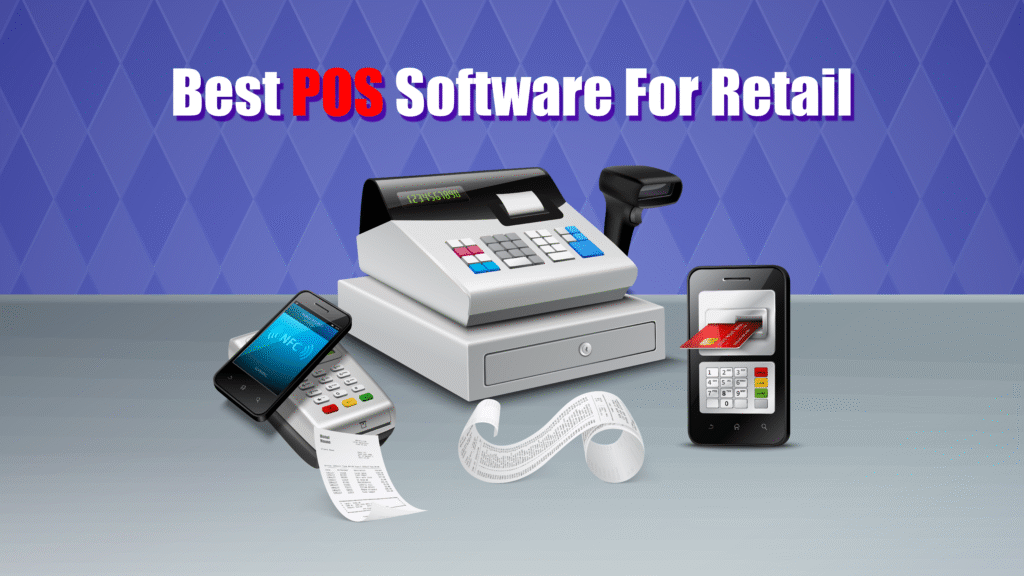Point-of-Sale (POS) software is vital for modern retail businesses seeking efficient transaction management, inventory control, and customer experience optimization. These systems centralize operations by enabling sales tracking, stock updates, and real-time reporting across multiple locations.
In 2026, over 85% of retail businesses report using POS software to streamline checkout processes and increase profitability. Major UK retailers like Tesco, Boots, and Currys rely on leading POS solutions such as Square, Lightspeed, and Vend to manage high-volume transactions and customer data effectively.
POS systems are replacing outdated registers due to features like contactless payment, cloud-based access, real-time analytics, and CRM integrations. Retailers choose POS software based on hardware compatibility, user-friendliness, scalability, and industry-specific features.
In short, here are the best POS software for retail businesses in 2026:
- Square POS – Best for small retailers and pop-up stores. Offers user-friendly mobile and countertop solutions with integrated payment processing.
- Lightspeed Retail – Best for inventory-rich businesses. Provides advanced inventory management, multi-store syncing, and eCommerce integration.
- Vend POS – Best for cloud-based retail operations. Enables fast transactions, loyalty programs, and detailed sales reporting.
- Shopify POS – Best for omnichannel retailers. Connects online and offline sales, manages products centrally, and tracks in-store performance.
- Toast POS – Best for food retail and QSRs. Built specifically for restaurants and cafes with kitchen display systems and order tracking.
Want a ranked overview of the top 15 POS software for retail in 2026, covering everything from mobile checkouts to enterprise-grade inventory tools? Let’s dive in!
Top 15 Best POS Software for Retail in 2026:
- Square POS – Best for Quick Setup and Mobile Payments
- Lightspeed Retail – Best for Advanced Inventory and Multi-Store Management
- Vend POS – Best for Cloud-Based Retail Operations
- Shopify POS – Best for Unified eCommerce and In-Store Sales
- Toast POS – Best for Foodservice and QSR Businesses
- Clover POS – Best for Customizable Hardware and App Market
- Revel Systems – Best for Scalable Enterprise POS Solutions
- ePOS Now – Best for UK-Based Retailers Needing Full POS Suites
- TouchBistro – Best for Restaurant and Hospitality-Focused Features
- Hike POS – Best for Inventory-Rich Retail Stores
- EPOS Direct – Best for Fast, Secure Retail Transactions in the UK
- PayPal Zettle – Best for Simple Mobile Payments and Invoicing
- NCR Silver – Best for Enterprise Retail and Grocery Chains
- Lightspeed Restaurant – Best for Hospitality and Reservation Management
- KORONA POS – Best for Ticketing, Events, and Niche Retail Needs
Before You Choose…
Choosing the right POS software can define a retail business’s ability to handle transactions, track sales, manage inventory, and enhance customer experience. With so many vendors and systems available, matching features to your business model is essential.
“Modern POS systems do more than process payments they centralize data and drive retail growth,” says James Holloway, Retail Tech Analyst at MarketLogic.
Questions to Ask When Choosing the Right POS Software
- Does it support your preferred payment methods including contactless and mobile wallets?
- Can it sync your in-store and online inventory in real time?
- Is it easy for staff to learn and operate during peak hours?
- Does it integrate with your CRM, accounting, or loyalty tools?
- Will it scale with your business as it expands?
Each POS software listed has been reviewed considering these crucial factors. Now let’s break down each tool in detail to help you make the best retail tech decision.
How This Top 15 List Was Created
We reviewed dozens of retail POS systems and ranked them based on transaction speed, inventory control, integration, usability, scalability, and overall value. Our team tested key features such as mobile payments, sales reporting, and customer engagement tools. We also collected verified user reviews to gauge reliability, onboarding experience, and long-term satisfaction.
This list includes POS software solutions for retailers of all sizes—from small boutiques to nationwide chains. Whether you operate a single location or multiple stores, we’ve identified options that deliver strong functionality for your scale.
Differences in Pricing and Pricing Models
Price Comparison for Small Retailers:
Solutions like Square POS, Hike POS, and PayPal Zettle provide cost-effective entry points. These platforms offer mobile-friendly hardware, basic inventory tools, and simplified checkout without high upfront costs. Ideal for startups and small shops.
Price Comparison for Midsize to Large Retailers:
Revel Systems, Lightspeed Retail, and NCR Silver cater to growing and enterprise-level operations. These systems feature robust inventory management, real-time analytics, loyalty integrations, and support for multi-location operations. Pricing may be higher but aligns with advanced needs.
Wondering which POS software will best support your retail business goals? Let’s dive into a detailed look at each of the top 15 retail POS platforms for 2026!
#1 – Square POS – Best for Comprehensive Retail Checkout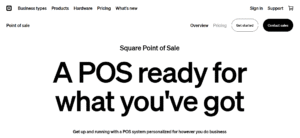
Square POS is a market leader in retail POS systems, offering a seamless blend of hardware, software, and payment processing. Designed for simplicity and speed, it is ideal for small to midsize retailers seeking full-featured point-of-sale functionality without high setup costs. Square supports mobile and in-store sales, making it suitable for pop-ups, boutiques, and physical retail outlets alike.
Review:
Square POS delivers a unified system that handles sales, inventory, and customer data from one dashboard. Its drag-and-drop tools and minimal hardware requirements reduce training time and boost usability. The system includes free software options and flexible payment processing, while upgrades offer advanced tools like employee management and customer loyalty.
Features of Square POS:
- Real-time inventory tracking and syncing
- Built-in payment processing with low fees
- Mobile POS support via smartphones and tablets
- Customer profile and loyalty program management
- Seamless integration with Square Online for eCommerce
Final Verdict:
Square POS is a dependable choice for retailers who need a fast, all-in-one solution for checkout, inventory, and sales management. It excels in usability, scalability, and cost-effectiveness. The system’s flexible setup, real-time analytics, and strong eCommerce integration make it a preferred option for both brick-and-mortar and mobile retail environments. Whether you run a pop-up shop or a growing retail chain, Square adapts to evolving business needs with minimal complexity.
Pros of Square POS:
- Easy to set up and use
- No monthly software fee for basic plan
- Strong mobile support for on-the-go sales
- Integrates well with eCommerce
- Extensive app marketplace
Cons of Square POS:
- Limited customization in free version
- Add-ons can increase total cost
- Offline mode lacks full functionality
- Less suited for large-scale retail chains
Limited support for advanced inventory metrics
#2 – Lightspeed Retail – Best for Advanced Inventory and Multi-Store Management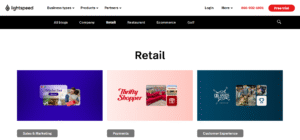
Lightspeed Retail specializes in complex inventory management and supports retailers operating multiple store locations. Its cloud-based platform allows real-time stock updates and centralized control of sales data. The software includes robust reporting tools and customer management features tailored for growing retail businesses.
Review:
Lightspeed Retail enables businesses to oversee inventory across various locations efficiently. Its interface supports bulk product imports, customizable pricing, and supplier management. The platform integrates with accounting software and eCommerce platforms, streamlining omnichannel retail operations.
Features of Lightspeed Retail:
- Multi-store inventory tracking and transfers
- Advanced reporting and analytics dashboards
- Integrated CRM for customer insights
- eCommerce integration with Lightspeed Online
- Purchase order and vendor management
Final Verdict:
Lightspeed Retail is an excellent choice for retailers needing detailed inventory control and multi-store management. It supports scalable business growth with tools designed for inventory-heavy operations. The software’s cloud-based accessibility ensures that managers can monitor sales and stock anytime, anywhere.
Pros of Lightspeed Retail:
- Strong inventory and multi-store support
- Comprehensive analytics and reporting
- Cloud-based with remote access
- Seamless eCommerce integration
- Intuitive user interface
Cons of Lightspeed Retail:
- Higher pricing for advanced plans
- Limited offline functionality
- Can be complex for very small retailers
- Customer support varies by region
- Learning curve for full feature set
#3 – Vend POS – Best for Cloud-Based Retail Operations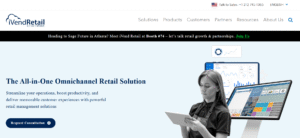
Vend POS offers cloud-first retail solutions with a focus on ease of use and quick setup. The platform supports seamless inventory, customer, and sales management from any device with internet access. Vend integrates well with payment processors and accounting software.
Review:
Vend POS simplifies daily retail operations by combining sales, inventory, and customer data into one system. The cloud-based platform offers automatic updates and real-time data sync. Users can customize receipts, manage staff permissions, and generate detailed sales reports.
Features of Vend POS:
- Cloud-based access on multiple devices
- Inventory and customer management
- Integrated payment processing
- Staff management and permissions
- Real-time sales reporting and analytics
Final Verdict:
Vend POS suits retailers seeking flexible, cloud-based solutions. Its scalability makes it ideal for growing businesses, while its intuitive design reduces training time. With strong integration options, Vend supports both in-store and online retail seamlessly.
Pros of Vend POS:
- Easy cloud access and updates
- User-friendly interface
- Flexible inventory controls
- Strong third-party integrations
- Reliable sales analytics
Cons of Vend POS:
- Limited offline capabilities
- Pricing increases with add-ons
- Customer support can be slow
- Advanced features require upgrades
- Occasional syncing delays
#4 – Shopify POS – Best for Unified eCommerce and In-Store Sales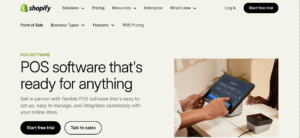
Shopify POS integrates retail point-of-sale with Shopify’s leading eCommerce platform. It allows retailers to manage both physical store and online sales in one system. The platform is popular for its ease of use and rich app ecosystem.
Review:
Shopify POS provides seamless integration between in-store sales and online storefronts. Retailers benefit from unified inventory, centralized customer profiles, and combined sales reporting. The system supports mobile checkout and multiple payment options.
Features of Shopify POS:
- Unified inventory for online and offline sales
- Mobile POS for quick checkout
- Customer profile and loyalty tracking
- Integration with Shopify eCommerce platform
- Access to extensive third-party apps
Final Verdict:
Shopify POS is ideal for retailers combining online and in-store channels. Its unified platform enhances inventory visibility and customer engagement. The system’s scalability supports small boutiques and larger retail chains alike.
Pros of Shopify POS:
- Smooth online and offline integration
- Extensive app marketplace
- Easy to use and implement
- Strong mobile checkout features
- Detailed customer data tracking
Cons of Shopify POS:
- Requires Shopify eCommerce subscription
- Transaction fees unless using Shopify Payments
- Limited customization in POS interface
- Advanced features cost extra
- Offline mode is basic
#5 – Toast POS – Best for Foodservice and QSR Businesses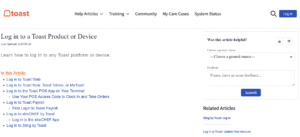
Toast POS is designed specifically for the foodservice industry, catering to restaurants, quick-service restaurants (QSRs), and cafes. It offers a complete restaurant management system, including order management, tableside ordering, and kitchen display systems. Its cloud-based platform supports real-time updates and reporting.
Review:
Toast POS excels in streamlining restaurant operations, helping staff manage orders efficiently and track inventory. The system integrates with online ordering and delivery platforms, supporting both dine-in and takeout services. Toast also offers employee management and payroll features, making it a comprehensive solution for foodservice businesses.
Features of Toast POS:
- Tableside ordering with handheld devices
- Real-time menu updates and inventory tracking
- Online ordering and delivery integration
- Employee scheduling and payroll management
- Robust reporting and analytics tailored to restaurants
Final Verdict:
Toast POS is a powerful choice for foodservice businesses that need specialized features to improve service speed and accuracy. Its focus on restaurant-specific workflows makes it easy for staff to use, while owners benefit from deep operational insights. The cloud infrastructure ensures data is always accessible and secure.
Pros of Toast POS:
- Tailored for foodservice and QSRs
- Integrated online ordering and delivery
- Comprehensive employee management
- Easy-to-use handheld ordering devices
- Detailed operational reporting
Cons of Toast POS:
- Pricing can be high for small cafes
- Limited outside foodservice industry use
- Hardware requirements may add cost
- Customer support response times vary
- Learning curve for advanced features
#6 – Clover POS – Best for Customizable Hardware and App Market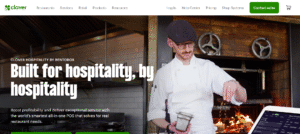
Clover POS offers an adaptable point-of-sale platform with customizable hardware options and a rich app marketplace. It serves a wide range of businesses, from retail shops to restaurants, providing flexibility to tailor the system to specific needs.
Review:
Clover POS combines hardware like touchscreen terminals and mobile devices with software that can be extended via hundreds of third-party apps. This allows businesses to add features such as loyalty programs, advanced reporting, and marketing tools. Clover’s intuitive interface simplifies training for staff.
Features of Clover POS:
- Variety of hardware options including mobile and stationary terminals
- Extensive app marketplace for customization
- Integrated payments and contactless options
- Inventory and employee management
- Real-time sales analytics and reporting
Final Verdict:
Clover POS stands out for its customization capabilities, allowing businesses to build a tailored POS solution. The wide range of hardware and apps ensures that it can adapt to diverse retail and hospitality environments. This flexibility, combined with ease of use, makes Clover a popular choice for businesses seeking growth and versatility.
Pros of Clover POS:
- Customizable hardware options
- Large app marketplace for features
- Simple and user-friendly interface
- Supports multiple payment methods
- Scalable for various business types
Cons of Clover POS:
- Some apps add extra costs
- Limited offline capabilities
- Customer support can be inconsistent
- Hardware can be expensive upfront
- Certain advanced features require technical know-how
#7 – Revel Systems – Best for Scalable Enterprise POS Solutions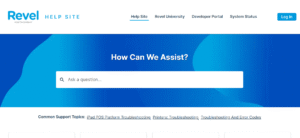
Revel Systems is a feature-rich POS platform built for enterprise-scale retail and hospitality businesses. It offers robust tools for inventory management, customer engagement, and employee scheduling, supporting high-volume operations with ease.
Review:
Revel Systems provides a comprehensive solution that integrates sales, inventory, and CRM in a single platform. The system supports offline mode to keep businesses running during internet outages. Revel is highly configurable and includes detailed reporting, making it suitable for multi-location enterprises.
Features of Revel Systems:
- Enterprise-level inventory and order management
- Integrated CRM and loyalty programs
- Offline mode for uninterrupted sales
- Employee scheduling and payroll features
- Advanced reporting and analytics
Final Verdict:
Revel Systems is ideal for large retail and hospitality businesses that require a scalable, all-in-one POS platform. Its extensive customization and enterprise-grade features empower businesses to streamline operations and enhance customer experiences. Though priced at a premium, it delivers significant value for complex business needs.
Pros of Revel Systems:
- Enterprise-grade scalability and features
- Robust offline mode
- Comprehensive customer management tools
- Detailed and customizable reporting
- Multi-location support
Cons of Revel Systems:
- Higher cost compared to basic POS systems
- Setup and training can be time-consuming
- Advanced features may require technical expertise
- Customer support response times vary
- Hardware costs add to total investment
#8 – ePOS Now – Best for UK-Based Retailers Needing Full POS Suites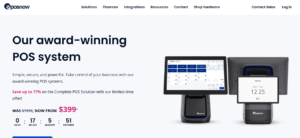
ePOS Now is a comprehensive POS solution tailored to the needs of UK retailers and hospitality businesses. It offers a full suite of features, including inventory management, customer loyalty programs, and multi-store support. Its cloud-based system allows seamless access across devices.
Review:
ePOS Now is popular among small to medium-sized UK businesses due to its user-friendly interface and strong local support. The platform supports barcode scanning, sales tracking, and integrated payment processing, making it an all-in-one solution for retail shops and cafes. The ability to manage multiple locations through one dashboard is a standout feature.
Features of ePOS Now:
- Cloud-based POS accessible from any device
- Integrated payment processing with EMV support
- Multi-store management and reporting
- Customer loyalty and marketing tools
- Inventory and staff management
Final Verdict:
ePOS Now provides UK retailers with a versatile POS system that balances powerful features and ease of use. Its focus on local businesses ensures tailored support and compliance with UK payment regulations. For businesses seeking a reliable, all-inclusive POS, ePOS Now offers great value.
Pros of ePOS Now:
- Designed specifically for UK businesses
- Strong multi-location management
- Integrated payment processing
- User-friendly and customizable interface
- Excellent customer support
Cons of ePOS Now:
- Some advanced features require add-ons
- Reporting tools could be more detailed
- Occasional syncing delays reported
- Hardware compatibility limited to ePOS offerings
- May have limited integrations with niche software
#9 – TouchBistro – Best for Restaurant and Hospitality-Focused Features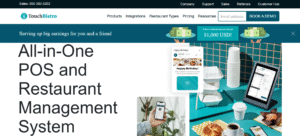
TouchBistro is a restaurant POS system built to meet the unique needs of hospitality businesses. It offers a rich set of tools for tableside ordering, menu management, and staff scheduling, designed to improve service efficiency and customer satisfaction.
Review:
TouchBistro is favored by independent restaurants and small chains for its ease of use and hospitality-specific capabilities. The system supports quick order entry, customizable menus, and real-time sales reporting. Its offline mode ensures uninterrupted operations even when internet connectivity is lost.
Features of TouchBistro:
- Tableside ordering with iPad-based terminals
- Flexible menu and modifier management
- Integrated payment processing and tipping
- Staff scheduling and labor cost management
- Real-time reporting and sales analytics
Final Verdict:
TouchBistro excels at simplifying restaurant operations with features built specifically for the hospitality industry. Its intuitive interface and offline capabilities make it reliable for busy environments. This POS is an excellent choice for restaurants seeking a robust yet easy-to-manage solution.
Pros of TouchBistro:
- Designed specifically for restaurants and hospitality
- Intuitive and fast tableside ordering
- Reliable offline functionality
- Comprehensive staff and menu management
- Strong customer support and training resources
Cons of TouchBistro:
- Limited outside the hospitality sector
- Hardware tied to iOS devices only
- Advanced reporting requires higher-tier plans
- May not scale well for very large enterprises
- Transaction fees can add up
#10 – Hike POS – Best for Inventory-Rich Retail Stores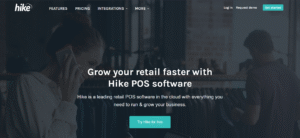
Hike POS is an excellent option for retailers with complex inventory needs. It provides powerful stock management, barcode scanning, and multi-store capabilities, making it suitable for businesses managing extensive product catalogs.
Review:
Hike POS streamlines retail operations by offering detailed inventory tracking, supplier management, and integrated eCommerce support. The platform allows retailers to monitor stock levels in real-time, create purchase orders, and manage product variations efficiently.
Features of Hike POS:
- Advanced inventory and stock control
- Barcode scanning and product variant management
- Multi-store and warehouse support
- Integrated eCommerce and online sales channels
- Customer loyalty programs and reporting
Final Verdict:
Hike POS stands out for retailers needing strong inventory control paired with ease of use. Its multi-channel support helps businesses unify in-store and online sales, improving customer reach. This platform suits growing retailers looking for reliable, scalable inventory management.
Pros of Hike POS:
- Powerful inventory and stock management
- Supports multiple stores and warehouses
- Integrates with major eCommerce platforms
- User-friendly interface and training materials
- Strong customer support
Cons of Hike POS:
- Reporting features can be basic in lower tiers
- Some users report occasional syncing delays
- Limited offline functionality
- Add-on costs for advanced integrations
- Mobile app could be improved
#11 – EPOS Direct – Best for Fast, Secure Retail Transactions in the UK
EPOS Direct offers a reliable POS system designed specifically for UK retailers who prioritize fast and secure transactions. It provides an all-in-one package with hardware, software, and ongoing support tailored to local business needs.
Review:
Known for its excellent UK customer service, EPOS Direct simplifies retail checkout processes with easy-to-use software and integrated payment options. The system supports a variety of industries, including retail shops, hospitality, and leisure businesses, offering flexible solutions that scale as you grow.
Features of EPOS Direct:
- Fast transaction processing with PCI-compliant payments
- Full hardware bundles including touchscreens and scanners
- Multi-site management with centralized reporting
- Inventory and staff management tools
- Dedicated UK-based support team
Final Verdict:
EPOS Direct is a dependable choice for UK retailers wanting quick, secure transactions combined with strong local support. Its tailored solutions and hardware packages make it ideal for businesses looking for a hassle-free POS setup and reliable operation.
Pros of EPOS Direct:
- UK-specific focus and support
- Fast and secure payment processing
- Comprehensive hardware and software bundles
- Scalable multi-site management
- Easy setup and training
Cons of EPOS Direct:
- Limited customization options
- Pricing details not always transparent upfront
- Smaller user community compared to larger brands
- Software updates may require downtime
- Some advanced features require additional fees
#12 – PayPal Zettle – Best for Simple Mobile Payments and Invoicing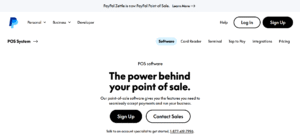
PayPal Zettle is designed for small businesses and mobile retailers who need a straightforward way to accept payments and manage invoices on the go. Its integration with PayPal’s global network offers convenience and familiarity for many users.
Review:
Ideal for market stalls, pop-up shops, and freelancers, PayPal Zettle provides a compact card reader and an intuitive mobile app for payment acceptance. It supports multiple payment types, including contactless and chip-and-PIN, and syncs sales data directly with PayPal accounts for easy financial management.
Features of PayPal Zettle:
- Mobile card reader supporting contactless and chip payments
- Simple invoicing and sales tracking
- Seamless integration with PayPal accounts
- No monthly fees; pay-as-you-go transaction pricing
- Supports multiple users and devices
Final Verdict:
PayPal Zettle is perfect for businesses prioritizing mobility and simplicity in payment processing. Its low entry cost and trusted payment platform make it an attractive solution for startups and small retailers looking for quick setup and flexible usage.
Pros of PayPal Zettle:
- Easy to use mobile payment system
- No monthly subscription fees
- Trusted PayPal integration
- Supports a variety of payment types
- Flexible for mobile and small-scale retail
Cons of PayPal Zettle:
- Limited advanced POS features
- Transaction fees can add up for high volume
- Not ideal for large or multi-store operations
- Lacks extensive inventory management
- Limited reporting capabilities
#13 – NCR Silver – Best for Enterprise Retail and Grocery Chains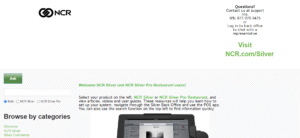
NCR Silver is a robust POS platform geared toward enterprise-level retailers and grocery stores. It offers extensive features designed to streamline large-scale retail operations with advanced reporting and integrations.
Review:
NCR Silver’s cloud-based system supports multiple locations and large transaction volumes while providing detailed sales analytics and employee management. Its hardware options include reliable terminals and peripherals designed to meet the demands of busy retail environments.
Features of NCR Silver:
- Multi-location management with centralized control
- Advanced sales analytics and reporting
- Employee management and scheduling tools
- Integrated payment processing and security features
- Customizable hardware options
Final Verdict:
NCR Silver is well suited for large retail and grocery businesses seeking a scalable, enterprise-grade POS system. Its comprehensive features and robust hardware options support high-volume sales environments while offering insights to optimize business performance.
Pros of NCR Silver:
- Scalable for large retailers and chains
- Strong reporting and analytics
- Reliable hardware built for heavy use
- Centralized management across stores
- Secure and compliant payment processing
Cons of NCR Silver:
- Higher cost compared to smaller POS solutions
- May require professional setup and training
- Less flexible for very small businesses
- Some users report slower customer support
- Complex pricing structure
#14 – Lightspeed Restaurant – Best for Hospitality and Reservation Management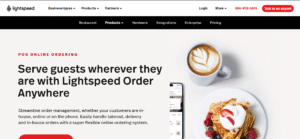
Lightspeed Restaurant is specifically designed for restaurants, cafés, and hospitality venues that require seamless reservation handling and table service management. With its cloud-based infrastructure, it supports fast-paced dining operations while offering deep insights into customer behavior and sales trends.
Review:
Lightspeed Restaurant provides a highly customizable interface tailored for hospitality workflows. From managing floor plans and splitting bills to handling table-side ordering and reservations, it empowers staff to deliver excellent customer service. Its reporting tools allow managers to make data-driven decisions, while integration with popular hospitality apps enhances its utility.
Features of Lightspeed Restaurant:
- Advanced table management and reservation system
- Floor plan customization for dine-in optimization
- Cloud-based access and offline capabilities
- Real-time reporting and analytics
- Integrations with food delivery platforms and payment systems
Final Verdict:
Lightspeed Restaurant is a comprehensive POS system for hospitality businesses seeking efficiency in service and reservations. Its robust features, tailored for the food and beverage industry, help restaurants streamline operations and deliver personalized guest experiences.
Pros of Lightspeed Restaurant:
- Powerful reservation and floor management tools
- Great for table service and dine-in restaurants
- Easy-to-use interface for staff
- Excellent third-party integration support
- Detailed analytics to improve service flow
Cons of Lightspeed Restaurant:
- Higher pricing for premium features
- Learning curve for new users
- Can be too complex for very small cafés
- Occasional syncing issues reported
- Offline mode can have limitations
#15 – KORONA POS – Best for Ticketing, Events, and Niche Retail Needs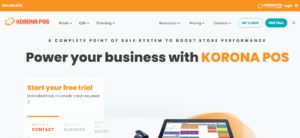
KORONA POS is a unique solution built for businesses in ticketing, events, and specialty retail sectors. With tailored features like ticket validation, membership tracking, and event scheduling, it supports a wide variety of niche use cases.
Review:
KORONA POS shines in environments like museums, amusement parks, and small boutique stores where customized workflows and quick access to event-based transactions are vital. Its cloud-based software allows easy access across locations, while features like employee time tracking and inventory reports round out a powerful platform.
Features of KORONA POS:
- Ticketing and membership management
- Cloud-based dashboard with real-time updates
- Time tracking and employee role control
- Event scheduling and promotions management
- Integration with payment processors and accounting tools
Final Verdict:
KORONA POS is ideal for events, ticketing, and specialty retail. It offers flexible tools for managing ticket sales, memberships, and staff access. With strong analytics and scalable performance, it suits niche businesses needing tailored POS solutions beyond standard retail systems.
Pros of KORONA POS:
- Excellent for events and ticketing industries
- Flexible and customizable interface
- Built-in time and membership tracking
- Great multi-location capabilities
- Affordable pricing for small to mid-sized businesses
Cons of KORONA POS:
- Niche focus may not suit general retail
- Interface may appear outdated to some users
- Limited native integrations
- No native mobile app
- Advanced features may require add-ons
Frequently Asked Questions (FAQs)
What is the best POS software for retail businesses in 2025?
Square POS, Shopify POS, and Lightspeed Retail are top choices. They offer ease of use, inventory tools, and omnichannel support for both physical and online retail businesses.
Can POS systems handle inventory and employee management?
Yes, most modern POS software includes inventory tracking, stock alerts, and employee performance tools. Lightspeed and Vend are particularly strong in this area for multi-location retailers.
Are POS systems cloud-based and mobile-friendly?
Absolutely. Solutions like Square, Zettle, and Clover offer mobile apps and cloud dashboards, allowing real-time sales tracking and flexibility for in-store or on-the-go use.
How much does POS software typically cost?
Prices vary by features. Entry-level systems may cost £0–£50/month, while advanced multi-store POS platforms like Revel can reach over £100/month depending on business size and hardware needs.
What features should I look for in retail POS software?
Key features include inventory management, customer profiles, integrated payments, loyalty tools, and real-time reporting. The best systems offer intuitive design and fast checkout experiences.
